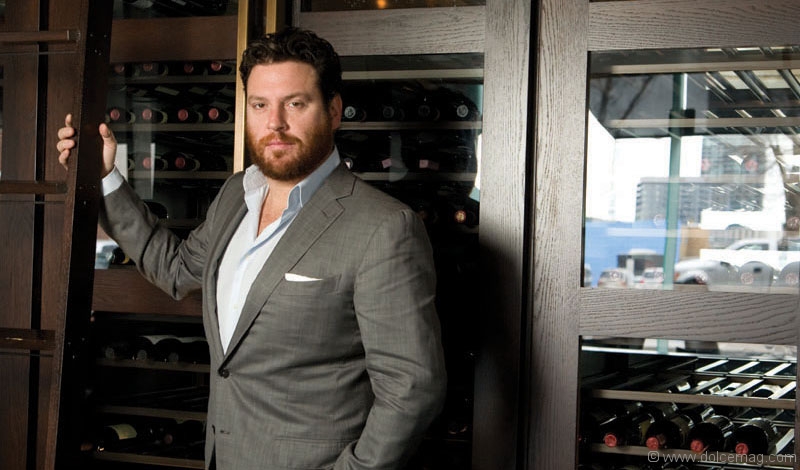The Perks of Being Scott Conant
Scott Conant is standing in one of his restaurant kitchens, holding an empty espresso cup in one hand while deftly working a Lavazza Blue machine with the other. It doesn’t take very long for the strong, hot coffee to appear in a plentiful stream, the foam lapping the rim of his cup. He keeps it simple: no milk or cream, just a bit of sugar to temper the liquid’s bold taste. His cooking is cut from the same cloth. Preferring his ingredients to stand both independently and collectively, the concept abounds in his renowned spaghetti with tomato and basil and creamy polenta dishes. He leaves molecular cooking to someone else. “It comes from a lot of thinking, a lot of listening to [Bob] Dylan, a lot of red wine.”
The American chef is the owner of Toronto’s Scarpetta restaurant (located in the Thompson Hotel), a succession that began in New York and expanded to the cities of Miami Beach, Las Vegas and Beverly Hills from 2008 to 2010. A bit weary after a late night with his staff, Conant is in Toronto to attend TIFF’s Food on Film event before heading back to Manhattan, where he lives with his wife and daughter. For now, he satisfies his mid-morning need for caffeine as he makes his way through the restaurant’s dimly lit hallway in a sharp grey blazer and rugged appearance, one that can easily pass for country singer Blake Shelton. He leads the way to a private event room, where a gorgeous table is set. Beyond rests the main dining area, where VIPs enjoy dinner on dark wood tables and booths that curve to form the letter S. “It’s a great feeling to walk in a room and see a balance of clientele, where there’s some older couples, younger couples or young women dining in groups – it’s the clientele that you want to have: diverse, with people open to trying new things. And, it’s fun.”
Conant is no stranger to a well-heeled crowd. He recalls working at a famed New York City restaurant in the halcyon days of the ’90s, when legendary musicians and actors would dine on authentic Italian fare imported by restaurateur Tony May. “San Domenico really was a special restaurant. Everyone was going there. Madonna would come in sometimes by herself and just have pasta with her bodyguard … Sophia Loren and [Luciano] Pavarotti would show up late night after the shows; Al Pacino would be there. When Barbara Streisand was in the house, you knew it in the kitchen … I’m not sure that that level of celebrity exists in the same way.” Before working as the sous chef at San Domenico, he trained in pastry at the Hotel Bayerischer Hof in Munich during a time when the Berlin Wall had just come down and people stood agape at things they’d never laid sight on. “People would look at products and say, ‘I’ve never seen a pineapple before.’ It was unbelievable to experience those things through their eyes,” says Conant, who now combines the tropical fruit in the coconut panna cotta dessert at Scarpetta Toronto.
The chef-turned-entrepreneur first shot to foodie fame in the early 2000s with high-end eateries L’Impero and Alto. But even delicious food and great reviews from New York’s most critical food columnists couldn’t keep him from forks in the road. Financially strapped, he would use his roommate’s share of rent to pay his staff. “Taking care of the people who make it happen: there’s nothing more important than that. If it means I get less, I get less, if it means I get an eviction letter on my apartment, I still get to do what I love every day.”
Conant relates to an idea brought about by chef Anthony Bordain, who likens the kitchen to a ship where cooks live as pirates that live up to a certain set of rules. The rent situation was decidedly his lowest point, one where he proved his loyalty to an industry he learned on his own. “I wasn’t the cook who came up working under David Bouley or Thomas Keller or Jean Georges … everything that I wanted to do, I wanted to make sure that it came from me, [that] it didn’t come from elsewhere, and if it did come from elsewhere, there was a filter that became mine, that way it’s inspired, it’s not exact. I’ve had people who’ve helped me, but I don’t think there is one person that I could put my successes on and say, ‘it’s because of this person,’” says Conant, who is also the owner of D.O.C.G Enoteca at
The Cosmopolitan in Las Vegas. Of his days at San Domenico, owner Tony May, who now heads SD26, recalls the disposition of his former employee. “Scott was a very aggressive, ambitious individual, and I think he’ll go a lot farther than where he is now.”
Born in Connecticut on Feb. 19, 1971, Conant’s earliest memories of food are rooted in his beginnings. He began cooking at 11 and attended the Culinary Institute of America at 18. He often returns to his mother’s Italian hometown in the province of Benevento, observing ingredients and culinary philosophies that are reflected in his modern approach to Italian food. Although she passed away when he was young, the confidence of his maternal grandmother still captivates him, with images of her making pasta as she entertained guests still dancing in his head. While he’s careful not to label himself as successful, his
innate entrepreneurial abilities continue to keep flutes overflowing and appetites sated.
It’s hard to decipher whether the caffeine has settled into his system or it’s just the energy emitted from a multitasking chef, but it seems as though Conant will at any moment spring from his chair for a round of push-ups. Author of two cookbooks (he’s currently working on his third, a guide for young chefs), host of 24 Hour Restaurant Battle (Food Network Canada) and recurrent judge on Chopped, he admittedly feels the everyday prickle of judgment himself. “I feel more often than not that I’m under a microscope.” He battles everyday scrutiny by doing what he does best: remaining acutely aware of his identity and faithful to the visions he sets forth for his restaurants. “Soulfulness, the mood, the ambience, the textural things: these are really important to be able to do something that, at its very core – at its essence – is savouring things to the last bite. Hence the name ‘Scarpetta’ – the swipe on a plate what a piece of bread would do: fare la Scarpetta – I put that in place as a constant reminder that this is what it’s all about.”






















































































No Comment